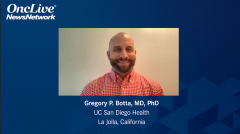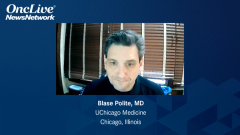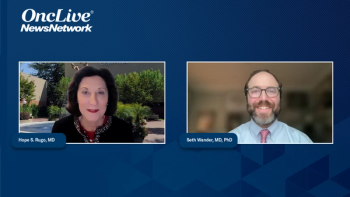
CIRCULATE-Japan: Using ctDNA to Guide Adjuvant Therapy in Colorectal Cancer
What to know about the design and results of the CIRCULATE-Japan study in colorectal cancer, in terms of using ctDNA analyses to help inform treatment decisions in the postoperative setting.
Episodes in this series

Gregory P. Botta, MD, PhD: CIRCULATE-Japan is a multiplatform study that is enrolling patients from basically stage I through stage IV colorectal cancer. It’s a conglomeration of a variety of studies. One is the GALAXY study, which is an observational study. There are also 2 other studies: VEGA and ALTAIR. The purpose of this large platform study is to determine 2 things: No. 1, how ctDNA [circulating tumor DNA] helps guide our prognostic information of our patients in the GALAXY setting; and No. 2, in the VEGA and ALTAIR setting, whether it’s able to either de-intensify patients or intensify patients to get chemotherapy.
What we’re finding is that patients who have ctDNA negativity after the resection of their colon cancer, are we able to observe a subset of these patients without giving them chemotherapy? We know that we over-treat approximately 20% to 25% of patients or even more who receive no additional benefit of chemotherapy and are likely cured from their disease after surgery. The issue is that pathologically, we’re unsure about who these patients are. Can ctDNA guide us and help remove chemotherapy from patients who don’t necessarily need it?
We also know that there are some patients who are undertreated. Approximately 20% or 25% of patients are undertreated. In those situations, if the ctDNA remains positive after their surgery, can we give them both standard of care therapy, whether that’s CAPOX [capecitabine, oxaliplatin] or FOLFOX [fluorouracil, leucovorin, oxaliplatin]? Or can we even intensify it further to something like FOLFIRINOX or FOLFOXIRI to help change the patients’ outcomes?
In the spectrum of colon cancer, we know that every patient is different, every pathology is different, and every prognosis is different. At this point, we try to fit everybody into a one-size-fits-all. A lot of studies initially based on the IDEA trial and these molecular residual disease trials are trying to substratify each group of patients into risk bins, which help to personalize the treatment recommendation for them so that they’re not overexposed to chemotherapy and the adverse effects that occur with it. It’s also so that we’re not trying to get through a therapy regimen that would have no benefit for that patient.
The CIRCULATE study in general is large. It has thousands and thousands of patients. However, they’re enrolling very well and quickly. The GALAXY observational arm had over 1500 patients in April 2021. I believe over 2500 patients have now enrolled, so it’s enrolled quickly. In the initial analysis, those patients have been broken down between stage I, stage II, stage III, and stage IV. These patients are overwhelmingly stage II and stage III, which makes sense. That’s where the ctDNA will really help inform us about decision-making.
Among the stage I patients, there are patients who have molecular residual disease, and we know that those patients will make ctDNA that can be tracked. However, at this time, stage I patients aren’t recommended adjuvant therapy. Of course, stage IV patients are recommended therapy. In stages II and III, the question is ultimately whether we can pick from some of these stage II and III patients, or whether we initiate therapy in some of the high-risk stage III patients. That’s where the rubber meets the road in the GALAXY study.
Transcript edited for clarity.


































